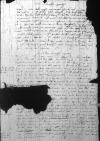Gestrigs tags / noch abzcoge der edlenn, wolgebornen hern ⌊elbingschnn und danczker castellan⌋ und Ewer Herlichkeit ⌊sones⌋, marienburgscherr underkemererr, / ist ein koniglicher kemererr an uns gelanget, / welcherr uns ⌊koniglicher majestet⌋, unsers allergnedigsten hern briff, an die hern ⌊rethe disser land⌋ vorczeichent, / des copeie hie eingeslossen, / hoth uberantwurt. / Weil das dazumhal hie noch gewesen sindt / der hochwirdige herr ⌊bischoff zu Colmenn⌋ und der ⌊ersamenn vonn Thornn⌋ geschickterr, / sein wir / zu uns die ersamenn hie des rats furderende / zusamne gekomenn, / uns disser sachen inhalth koniglichs briffs, / undreinander ... nichts fuglicher mocht findenn, / dan das wir hochgemelter koniglicher [majestet] ... ...bnn, / wie obenn gemelt, / und das wir ...en davon / andrenn stenden das rots disser ... ...nenn / was dann in der kurcze durch schreibnn ... ...lchenn schrifften under uns wurd entslossnn ... lossenn wissen. / Von der sachnn in sich ... ...nn hie hab wir nichts anders nuczlicherr bedocht / ... vorschob und erstreckung der zceit biss uff negst k[unff]tige ⌊tagfart⌋ wurd von ⌊koniglicher majestet⌋ gebeten, / mit vorbehalt, was sonst eimm idernn zu dissemm handel das beste wurd beduncken, das wir das schrifftlich einer dem andrenn lissenn wissenn. / Solchs so an uns wurd komenn, / wolde wir mit denn ⌊hochwirdigen hern zu Colem⌋ under uns wol einnemenn und des meisten teils stym zum antwurt ⌊koniglicher majestet⌋ zufertigen. / Derwegen Ewer Herlichkeit wolde uns [m]it den ersten ...enn willen und votum wissenn lossenn. / Die wir hiemit in langweriger gesuntheit gotlichnn gnaden befelnn.
